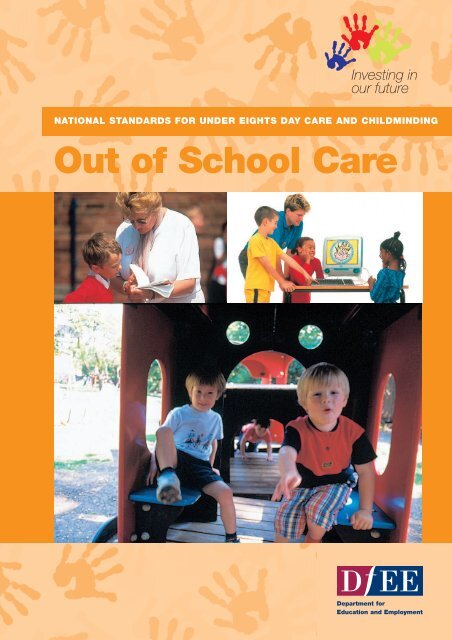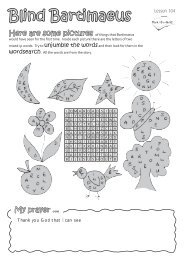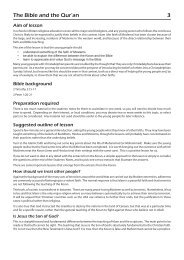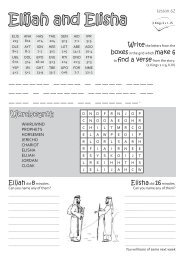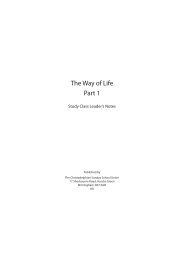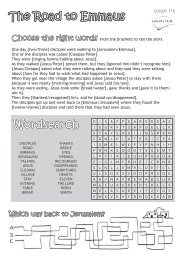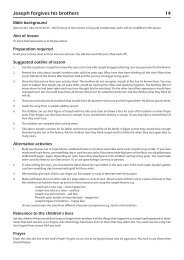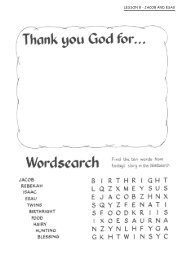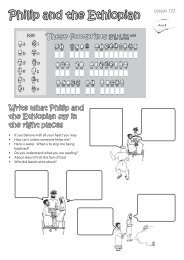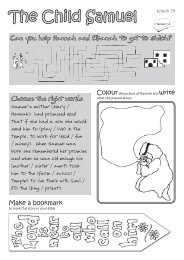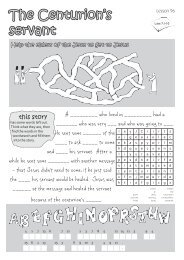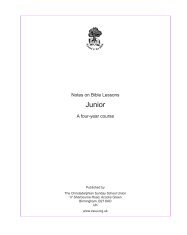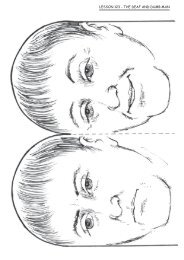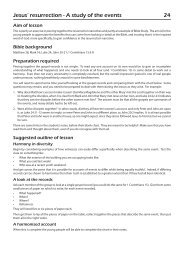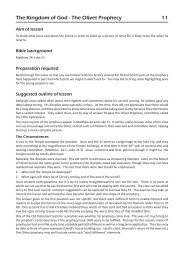NATIONAL STANDARDS Out of school care
NATIONAL STANDARDS Out of school care
NATIONAL STANDARDS Out of school care
Create successful ePaper yourself
Turn your PDF publications into a flip-book with our unique Google optimized e-Paper software.
Investing in<br />
our future<br />
<strong>NATIONAL</strong> <strong>STANDARDS</strong> FOR UNDER EIGHTS DAY CARE AND CHILDMINDING<br />
<strong>Out</strong> <strong>of</strong> School Care
<strong>Out</strong> <strong>of</strong> <strong>school</strong> <strong>care</strong><br />
Introduction<br />
The Government is committed to promoting the welfare and development <strong>of</strong> all our young<br />
children. Good quality <strong>care</strong> and education in the early years raise educational standards<br />
and opportunities, and enhance children’s social development.<br />
The National Child<strong>care</strong> Strategy was launched in 1998 to expand child<strong>care</strong> services. The<br />
Government is determined that all child<strong>care</strong> services, be they new or established, provide<br />
a secure and safe environment for children, not least so that parents can have confidence<br />
that their children are well looked after.<br />
In 1999 the Government announced that in England day <strong>care</strong> providers and childminders<br />
caring for children under the age <strong>of</strong> eight years old would be regulated by a new Early<br />
Years Directorate within the Office for Standards in Education (Ofsted).<br />
ABOUT THE <strong>NATIONAL</strong> <strong>STANDARDS</strong><br />
The National Standards represent a baseline <strong>of</strong> quality below which no provider may<br />
fall. However, they are also intended to underpin a continuous improvement in quality<br />
in all settings.<br />
There are 14 National Standards. Each Standard describes a particular quality outcome,<br />
and is accompanied by a set <strong>of</strong> supporting criteria giving information about how that<br />
outcome is to be achieved. The criteria are matched to each <strong>of</strong> five different types <strong>of</strong><br />
day <strong>care</strong> and childminding provision:<br />
●<br />
●<br />
●<br />
●<br />
●<br />
Full day <strong>care</strong>;<br />
Sessional day <strong>care</strong>;<br />
Crèches;<br />
<strong>Out</strong> <strong>of</strong> <strong>school</strong> <strong>care</strong>;<br />
Childminders.<br />
In addition, a number <strong>of</strong> annexes have been attached where appropriate, explaining<br />
how the criteria will be applied to overnight <strong>care</strong>, facilities caring for babies and open<br />
access schemes.<br />
Regulations under the Children Act require providers (technically the registered person in<br />
each registered setting) to meet the 14 Standards. The regulations also require providers<br />
to have regard to the supporting criteria. Ofsted is required to have regard to both the<br />
Standards and the supporting criteria, and is responsible for issuing guidance on how the<br />
outcomes required by the National Standards may be achieved.<br />
1
<strong>Out</strong> <strong>of</strong> <strong>school</strong> <strong>care</strong><br />
The National Standards do not override the need for providers to comply with other<br />
legislation such as that covering health and safety, food hygiene, fire or planning<br />
requirements.<br />
The National Standards apply to new child<strong>care</strong> providers who have applied to Ofsted for<br />
registration after 2 July 2001, and to all other providers with effect from 1 September<br />
2001. The Standards and supporting criteria will be reviewed within two years to ensure<br />
that they remain up to date.<br />
2
<strong>Out</strong> <strong>of</strong> <strong>school</strong> <strong>care</strong><br />
<strong>NATIONAL</strong> <strong>STANDARDS</strong><br />
<strong>Out</strong> <strong>of</strong> <strong>school</strong><br />
<strong>care</strong><br />
Definition<br />
Facilities that provide day <strong>care</strong> for children under eight which operate during one<br />
or more <strong>of</strong> the following periods:<br />
●<br />
●<br />
●<br />
before <strong>school</strong><br />
after <strong>school</strong><br />
during the <strong>school</strong> holidays.<br />
The total <strong>care</strong> provided is for more than 2 hours in any day and for more than five<br />
days a year.<br />
A main purpose <strong>of</strong> the provision is to look after children in the absence <strong>of</strong> their<br />
parents. This form <strong>of</strong> <strong>care</strong> can include children from three years old and children over<br />
eight may use it.<br />
E.g. summer camps, holiday play schemes, breakfast clubs, after <strong>school</strong> clubs.<br />
Open access schemes are included. These may be permanent or short-term schemes<br />
and generally cater for older children, however, children aged 5–7 may attend. The<br />
main purpose <strong>of</strong> the provision is to provide supervised play opportunities for children<br />
in a safe environment in the absence <strong>of</strong> their parents. Criteria which do not apply to<br />
Open Access Schemes are marked with an asterisk and alternative criteria are given<br />
in Annex A.<br />
Whenever the word “parent” is used in this document, it should be taken to mean<br />
parent or <strong>care</strong>r.<br />
3
<strong>Out</strong> <strong>of</strong> <strong>school</strong> <strong>care</strong><br />
<strong>NATIONAL</strong> <strong>STANDARDS</strong><br />
Contents<br />
STANDARD 1<br />
Suitable person: Adults providing day <strong>care</strong>, looking after children or having unsupervised<br />
access to them are suitable to do so. Page 7<br />
STANDARD 2<br />
Organisation: The registered person meets required adult:child ratios, ensures that<br />
training and qualifications requirements are met and organises space and resources<br />
to meet the children’s needs effectively. Page 8<br />
STANDARD 3<br />
Care, learning and play: The registered person meets children’s individual needs and<br />
promotes their welfare. They plan and provide activities and play opportunities to<br />
develop children’s emotional, physical, social and intellectual capabilities. Page 10<br />
STANDARD 4<br />
Physical environment: The premises are safe, secure and suitable for their purpose.<br />
They provide adequate space in an appropriate location, are welcoming to children and<br />
<strong>of</strong>fer access to the necessary facilities for a range <strong>of</strong> activities which promote their<br />
development. Page 10<br />
STANDARD 5<br />
Equipment: Furniture, equipment and toys are provided which are appropriate for their<br />
purpose and help to create an accessible and stimulating environment. They are <strong>of</strong> suitable<br />
design and condition, well maintained and conform to safety standards. Page 12<br />
STANDARD 6<br />
Safety: The registered person takes positive steps to promote safety within the setting<br />
and on outings and ensures proper precautions are taken to prevent accidents. Page 12<br />
STANDARD 7<br />
Health: The registered person promotes the good health <strong>of</strong> children and takes positive<br />
steps to prevent the spread <strong>of</strong> infection and appropriate measures when they are ill. Page 14<br />
STANDARD 8<br />
Food and drink: Children are provided with regular drinks and food in adequate quantities<br />
for their needs. Food and drink is properly prepared, nutritious and complies with dietary<br />
and religious requirements. Page 16<br />
5
<strong>Out</strong> <strong>of</strong> <strong>school</strong> <strong>care</strong><br />
STANDARD 9<br />
Equal opportunities: The registered person and staff actively promote equality <strong>of</strong><br />
opportunity and anti-discriminatory practice for all children. Page 16<br />
STANDARD 10<br />
Special needs (including special educational needs and disabilities): The registered<br />
person is aware that some children may have special needs and is proactive in ensuring that<br />
appropriate action can be taken when such a child is identified or admitted to the provision.<br />
Steps are taken to promote the welfare and development <strong>of</strong> the child within the setting in<br />
partnership with the parents and other relevant parties. Page 17<br />
STANDARD 11<br />
Behaviour: Adults caring for children in the provision are able to manage a wide range <strong>of</strong><br />
children’s behaviour in a way which promotes their welfare and development. Page 18<br />
STANDARD 12<br />
Working in partnership with parents and <strong>care</strong>rs: The registered person and staff work<br />
in partnership with parents to meet the needs <strong>of</strong> the children, both individually and as a group.<br />
Information is shared. Page 19<br />
STANDARD 13<br />
Child protection: The registered person complies with local child protection procedures<br />
approved by the Area Child Protection Committee and ensures that all adults working and<br />
looking after children in the provision are able to put the procedures into practice. Page 20<br />
STANDARD 14<br />
Documentation: Records, policies and procedures which are required for the efficient and<br />
safe management <strong>of</strong> the provision, and to promote the welfare, <strong>care</strong> and learning <strong>of</strong> children<br />
are maintained. Records about individual children are shared with the children’s parent. Page 20<br />
ANNEX A<br />
Alternative criteria for Open Access Schemes: Alterations to relevant criteria in<br />
the main <strong>Out</strong> <strong>of</strong> School Care module to cater for the different circumstances in which<br />
Open Acess Schemes operate. Page 22<br />
ANNEX B<br />
Overnight <strong>care</strong>: These are additional criteria to be met by a registered person providing<br />
out <strong>of</strong> <strong>school</strong> <strong>care</strong> who wishes to <strong>care</strong> for children overnight. Page 24<br />
6
<strong>Out</strong> <strong>of</strong> <strong>school</strong> <strong>care</strong><br />
STANDARD 1<br />
Suitable person<br />
Adults providing day <strong>care</strong>, looking after children or having unsupervised access to<br />
them are suitable to do so.<br />
SUPPORTING CRITERIA:<br />
1.1 The registered person complies with all conditions <strong>of</strong> registration, including any which<br />
require them to submit to a vetting procedure whereby the information supplied is verified<br />
with the relevant sources.<br />
The vetting procedure, which includes police checks, will enable the early years child <strong>care</strong><br />
inspector to determine the suitability <strong>of</strong> those caring for, or having regular contact with,<br />
children. If the registered person fails to comply with such a condition the early years<br />
child <strong>care</strong> inspector may, amongst other things, take this into account in determining<br />
their suitability.<br />
1.2 The registered person, their staff and volunteers have not been convicted <strong>of</strong> an <strong>of</strong>fence or<br />
been the subject <strong>of</strong> an order which disqualifies them from registration under regulations<br />
made under schedule 9A <strong>of</strong> the Children Act 1989.<br />
Where disqualification arising from an <strong>of</strong>fence carries a time-limit in the regulations, and<br />
that time-limit has expired, or where an <strong>of</strong>fence mentioned in the regulations made under<br />
schedule 9A was not subject to a qualifying sentence, or where the person is or has been<br />
the subject <strong>of</strong> an order mentioned in the Disqualification for Caring for Children Regulations<br />
1991, in determining the suitability <strong>of</strong> the registered person the early years child <strong>care</strong><br />
inspector will have regard to all circumstances <strong>of</strong> the <strong>of</strong>fence or order. Factors will include<br />
the date <strong>of</strong> <strong>of</strong>fence or order, the type <strong>of</strong> <strong>of</strong>fence or order, the degree <strong>of</strong> culpability <strong>of</strong> the<br />
person and the person's activity and involvement with children since the <strong>of</strong>fence or order.<br />
1.3 The registered person ensures that any person who has not been vetted is never left<br />
alone with children.<br />
QUALIFICATIONS<br />
1.4 The person in charge who is present has at least a level 3 qualification appropriate to<br />
the post.<br />
In addition:<br />
●<br />
●<br />
the manager has at least 2 years’ experience <strong>of</strong> working in a day <strong>care</strong> setting;<br />
trainees under 17 years <strong>of</strong> age are supervised at all times and are not counted in<br />
the adult:child ratios;<br />
7
<strong>Out</strong> <strong>of</strong> <strong>school</strong> <strong>care</strong><br />
●<br />
●<br />
all managers, staff and volunteers are suitable, both mentally and physically, to <strong>care</strong><br />
for children;<br />
all managers, staff and volunteers have the appropriate experience, skills and ability to do<br />
their jobs.<br />
STANDARD 2<br />
Organisation<br />
The registered person meets required adult:child ratios, ensures that training and<br />
qualifications requirements are met and organises space and resources to meet the<br />
children’s needs effectively.<br />
SUPPORTING CRITERIA:<br />
2.1 The registered person demonstrates that staff are deployed effectively within the premises<br />
to ensure the safety, welfare and development <strong>of</strong> children.<br />
2.2 There is a named deputy who is able to take charge in the absence <strong>of</strong> the manager.<br />
GROUP SIZE AND THE KEY PERSON SYSTEM<br />
*2.3 In all day/holiday provision, every child is allocated to a member <strong>of</strong> staff who is his/her key<br />
person and is mainly responsible for his/her well-being on a daily basis and ensures that<br />
information about the child is exchanged with the parent. Children in all types <strong>of</strong> provision<br />
are allocated to groups <strong>of</strong> an appropriate size for the activities being undertaken. The size<br />
<strong>of</strong> a group never exceeds 26 children. The provision may include more than one group.<br />
STAFF TRAINING AND QUALIFICATIONS<br />
*2.4 The registered person ensures that:<br />
●<br />
●<br />
●<br />
at least half <strong>of</strong> all staff hold a level 2 qualification appropriate for the <strong>care</strong> or<br />
development <strong>of</strong> children. Where this cannot be achieved immediately, providers set<br />
out an action plan detailing how they intend to meet this criterion and in what<br />
timescale. Ofsted will consider the plan <strong>of</strong>fering their approval or indicating aspects<br />
that need improvement;<br />
all staff have induction training which includes health and safety and child protection<br />
policies and procedures in their first week <strong>of</strong> employment;<br />
the continuing training needs <strong>of</strong> staff are met.<br />
8
<strong>Out</strong> <strong>of</strong> <strong>school</strong> <strong>care</strong><br />
2.5 Accessible individual records are kept on the premises containing the name and address<br />
<strong>of</strong> the staff members, any volunteers and committee members and information about<br />
recruitment, training and qualifications.<br />
STAFFING RATIOS<br />
*2.6 The minimum staffing ratio is: 1:8 children aged 3–7 years. This ratio includes any<br />
children <strong>of</strong> staff and volunteers.<br />
2.7 These staffing levels are maintained during outings but, according to circumstances, may<br />
need to exceed them.<br />
2.8 There is a minimum <strong>of</strong> two adults on duty.<br />
2.9 Any <strong>care</strong> provided for children aged 8–14 is not allowed to adversely affect the <strong>care</strong><br />
provided for children under 8 years old.<br />
*2.10 Regular volunteers and trainees can be taken into account in the normal staffing ratios<br />
but there are at least two full staff members in every group <strong>of</strong> 26 children, at least one<br />
<strong>of</strong> whom holds, or is working towards, an appropriate qualification.<br />
2.11 The registered person ensures that suitable contingency arrangements are in place to<br />
cover emergencies and unexpected staff absences, and sufficient suitable staff and<br />
volunteers to cover staff breaks, holidays, sickness and time spent with parents.<br />
SPECIALIST SPORTING OR ADVENTURE ACTIVITIES<br />
2.12 The registered person maintains written operating procedures for each specialist activity<br />
programme they <strong>of</strong>fer, which are appropriate to the site and the level at which activities<br />
are undertaken. Operating procedures define the competencies, qualifications and/or<br />
experience required <strong>of</strong> staff undertaking different levels <strong>of</strong> responsibility. The procedures<br />
are consistent with the Health and Safety Executive guidelines where appropriate, Activity<br />
Centre Advisory Committee guidelines where established and with the National Governing<br />
Body guidelines where they are relevant to the safe conduct <strong>of</strong> the activity at the level<br />
undertaken. All staff with management responsibility for an activity possess the<br />
competencies, qualifications and experience required to discharge the responsibility.<br />
REGISTRATION SYSTEM<br />
*2.13 There is a system for registering children and staff attendance on a daily basis, showing<br />
times <strong>of</strong> arrival and departure. Children under eight are escorted to <strong>school</strong> when<br />
a breakfast club session ends, and from <strong>school</strong> to the after <strong>school</strong> club at the end<br />
<strong>of</strong> the <strong>school</strong> day.<br />
9
<strong>Out</strong> <strong>of</strong> <strong>school</strong> <strong>care</strong><br />
STANDARD 3<br />
Care, learning and play<br />
The registered person meets children’s individual needs and promotes their welfare.<br />
They plan and provide activities and play opportunities to develop children’s<br />
emotional, physical, social and intellectual capabilities.<br />
SUPPORTING CRITERIA:<br />
3.1 The registered person plans a range <strong>of</strong> activities and play opportunities, and provide<br />
resources which are appropriate to the ages and interests <strong>of</strong> the children attending.<br />
3.2 The registered person plans and provide activities and play opportunities which allow<br />
children to use their imagination and in which they have as much choice as possible.<br />
3.3 The registered person and their staff listen and value what children say, they talk with<br />
them about what they are doing and have high expectations <strong>of</strong> what they can achieve.<br />
3.4 The registered person and their staff encourage children to be confident, independent and<br />
develop their self esteem.<br />
3.5 The registered person ensures all staff help children to learn about what is right<br />
and wrong.<br />
STANDARD 4<br />
Physical environment<br />
The premises are safe, secure and suitable for their purpose. They provide adequate<br />
space in an appropriate location, are welcoming to children and <strong>of</strong>fer access to the<br />
necessary facilities for a range <strong>of</strong> activities which promote their development.<br />
SUPPORTING CRITERIA:<br />
4.1 The premises are made welcoming and friendly to children and parents.<br />
4.2 The premises are clean, well lit, adequately ventilated, and maintained in a suitable state<br />
<strong>of</strong> repair and decoration.<br />
4.3 The rooms used for out <strong>of</strong> <strong>school</strong> <strong>care</strong> are for the sole use <strong>of</strong> the facility during the hours<br />
<strong>of</strong> operation.<br />
10
<strong>Out</strong> <strong>of</strong> <strong>school</strong> <strong>care</strong><br />
4.4 The registered person ensures they operate within local planning and building control<br />
requirements.<br />
4.5 There is access to a telephone on the premises.<br />
4.6 Rooms are maintained at an adequate temperature.<br />
INDOOR ACTIVITY AREA<br />
*4.7 The space standards provide minimum space requirements for the whole provision. The<br />
registered person shows how this space will be divided up and used to provide activities<br />
for children and how staff will be deployed within it.<br />
*4.8 There is a minimum <strong>of</strong> 2.3 sq. metres space per child.<br />
*4.9 Provision is made (space or partitioned area) for children who wish to relax or play quietly,<br />
equipped with appropriate furniture. This area may be converted from normal play space<br />
provided children can rest safely without disturbance.<br />
4.10 Play areas are large enough to give scope for free movement and well spread out<br />
activities. There are separate areas for different activities.<br />
4.11 There is adequate storage space for equipment.<br />
OUTDOOR SPACE<br />
4.12 If outdoor play space adjoining the premises is provided, it is safe, secure and well<br />
maintained.<br />
TOILET FACILITIES<br />
4.13 There is normally one toilet and one wash hand basin with hot and cold water available<br />
for every 10 children.<br />
KITCHEN<br />
4.14 If there is a kitchen area, children do not have access to it unless it is being used solely<br />
for a supervised children’s activity.<br />
11
<strong>Out</strong> <strong>of</strong> <strong>school</strong> <strong>care</strong><br />
STANDARD 5<br />
Equipment<br />
Furniture, equipment and toys are provided which are appropriate for their purpose<br />
and help to create an accessible and stimulating environment. They are <strong>of</strong> suitable<br />
design and condition, well maintained and conform to safety standards.<br />
SUPPORTING CRITERIA:<br />
5.1 The registered person ensures that sufficient, suitable equipment and materials are<br />
available to provide stimulating activities and play opportunities for the children. These are<br />
appropriate for the ages and individual developmental needs <strong>of</strong> the children.<br />
5.2 Furniture, toys and equipment on the premises are in good repair and conform to BS EN<br />
safety standards or the Toys (Safety) Regulations (1995) where applicable. Where public<br />
playgrounds are used, the registered person ensures that the children do not use faulty<br />
equipment.<br />
5.3 There is adequate equipment for outdoor and sporting activities where applicable. Where<br />
the premises include outside space, fixed climbing frames and other large equipment<br />
conform to BS EN standards where applicable, and are securely anchored to the ground.<br />
5.4 During water sports, adequate lifesaving equipment and buoyancy aids are provided.<br />
STANDARD 6<br />
Safety<br />
The registered person takes positive steps to promote safety within the setting and<br />
on outings and ensures proper precautions are taken to prevent accidents.<br />
SUPPORTING CRITERIA:<br />
6.1 The registered person takes reasonable steps to ensure that hazards to children on the<br />
premises, both inside and outside, are minimised and is aware <strong>of</strong>, and complies with,<br />
Health and Safety regulations. Staff are trained to have an understanding <strong>of</strong> Health and<br />
Safety requirements for the environment in which they work.<br />
12
<strong>Out</strong> <strong>of</strong> <strong>school</strong> <strong>care</strong><br />
RISK ASSESSMENT<br />
6.2 The registered person conducts a risk assessment <strong>of</strong> the premises and this is reviewed if<br />
there is a significant change or if the registered person suspects that it is no longer valid.<br />
An action plan with timescales identifies action to be taken to minimise identified risks.<br />
GAS/ELECTRICITY<br />
6.3 Gas, electrical and other appliances and fittings conform to safety requirements and do<br />
not pose a hazard to children.<br />
SECURITY<br />
*6.4 The premises and outside play area are secure and children are not be able to leave<br />
them unsupervised. The registered has an effective system for managing access to the<br />
premises, ensures that it is used, and keeps a record <strong>of</strong> visitors.<br />
6.5 Children are supervised at all times.<br />
OUTSIDE AREA<br />
6.6 Ponds, drains, pools or any natural water, are made safe or inaccessible to children.<br />
<strong>Out</strong>door water activities are closely supervised at all times.<br />
ACTIVITIES<br />
6.7 All water sports are supervised by a qualified lifeguard.<br />
6.8 Potentially hazardous equipment is securely stored.<br />
FIRE SAFETY<br />
6.9 There are clearly defined procedures for emergency evacuation <strong>of</strong> the building, which<br />
include any special measures to be taken where children are located above or below<br />
ground level, known to all staff. Fire drills are carried out periodically, including all new<br />
groups <strong>of</strong> children. The registered person complies with any recommendations made by<br />
the Fire Safety Officer and records are kept to his satisfaction.<br />
6.10 Fire doors are not obstructed and fire exits are clearly identifiable and easily opened from<br />
the inside.<br />
6.11 Adequate fire detection and control equipment are readily available.<br />
13
<strong>Out</strong> <strong>of</strong> <strong>school</strong> <strong>care</strong><br />
OUTINGS AND TRANSPORT<br />
6.12 The registered person ensures that there are operational procedures for the safe conduct<br />
<strong>of</strong> any outings provided. Records are kept about vehicles in which children are<br />
transported, including insurance details and a list <strong>of</strong> named drivers. Drivers using their<br />
own transport have adequate insurance cover.<br />
INSURANCE<br />
6.13 The registered person carries public liability insurance for the provision.<br />
STANDARD 7<br />
Health<br />
The registered person promotes the good health <strong>of</strong> children and takes positive steps<br />
to prevent the spread <strong>of</strong> infection and appropriate measures when they are ill.<br />
SUPPORTING CRITERIA:<br />
HYGIENE<br />
7.1 The premises and equipment are clean.<br />
7.2 The registered person ensures that staff are informed and aware <strong>of</strong> the importance <strong>of</strong><br />
good hygiene practice in order to prevent the spread <strong>of</strong> infection. Staff are informed<br />
<strong>of</strong> and kept up to date with hygiene procedures.<br />
ANIMALS<br />
7.3 The registered person ensures that any animals on the premises are safe to be in the<br />
proximity <strong>of</strong> children and do not pose a health risk.<br />
FOOD HANDLING<br />
7.4 Those responsible for the preparation and handling <strong>of</strong> food are fully aware <strong>of</strong>, and comply<br />
with, regulations relating to food safety and hygiene.<br />
MEDICINE<br />
7.5 The registered person has a clear policy, understood by all staff and discussed with<br />
parents, regarding the administration <strong>of</strong> medication. If medicine is to be given, it includes<br />
the following:<br />
14
<strong>Out</strong> <strong>of</strong> <strong>school</strong> <strong>care</strong><br />
●<br />
●<br />
●<br />
●<br />
●<br />
medicines are stored in their original containers, clearly labelled and inaccessible to<br />
children;<br />
medicines are not usually administered unless they have been prescribed for that child<br />
by a doctor;<br />
the parent gives prior written permission to administer any medication;<br />
written records are kept <strong>of</strong> all medicines administered to children, and parents sign the<br />
record book to acknowledge the entry;<br />
if the administration <strong>of</strong> prescription medicines requires technical/medical knowledge then<br />
individual training is provided for staff from a qualified health pr<strong>of</strong>essional. Training is specific to<br />
the individual child concerned.<br />
FIRST AID<br />
7.6 There is a first aid box complying with the Health and Safety (First Aid) Regulations 1981,<br />
the contents <strong>of</strong> which are checked frequently and replaced as necessary by a designated<br />
member <strong>of</strong> staff. It is kept in an accessible place out <strong>of</strong> the reach <strong>of</strong> children.<br />
7.7 There is at least one member <strong>of</strong> staff with a current first aid training certificate on the<br />
premises or on outings at any one time. The first aid qualification includes training in first<br />
aid for infants and young children.<br />
7.8 Written parental permission is requested, at the time <strong>of</strong> the placement, to the seeking <strong>of</strong><br />
any necessary emergency medical advice or treatment in the future.<br />
7.9 A record is maintained, signed by the parent, <strong>of</strong> any accidents.<br />
SICK CHILDREN<br />
7.10 There is a policy about the exclusion <strong>of</strong> children who are ill or infectious which is discussed<br />
with parents. This includes a procedure for contacting parents or another adult designated<br />
by the parent if a child becomes ill while in the provision.<br />
SAND PITS<br />
7.11 Sand pits are protected from contamination and the sand is clean.<br />
SMOKING<br />
7.12 There is a no smoking policy.<br />
15
<strong>Out</strong> <strong>of</strong> <strong>school</strong> <strong>care</strong><br />
STANDARD 8<br />
Food and drink<br />
Children are provided with regular drinks and food in adequate quantities for their<br />
needs. Food and drink is properly prepared, nutritious and complies with dietary and<br />
religious requirements.<br />
SUPPORTING CRITERIA:<br />
8.1 Fresh drinking water is available to children at all times.<br />
8.2 If snacks and drinks are provided, the registered person requests information from<br />
parents about any special dietary requirements, preferences or food allergies the child<br />
may have. Where these exist, the registered person makes a record and takes heed <strong>of</strong><br />
the information provided.<br />
*8.3 Children attending all day are <strong>of</strong>fered a midday meal or packed lunch which can be<br />
provided by parents. Parents are advised <strong>of</strong> what can be stored safely.<br />
STANDARD 9<br />
Equal opportunities<br />
The registered person and staff actively promote equality <strong>of</strong> opportunity and antidiscriminatory<br />
practice for all children.<br />
SUPPORTING CRITERIA:<br />
9.1 The registered person has, and periodically reviews, an equal opportunities policy which<br />
is consistent with current legislation and guidance. All staff and volunteers understand<br />
and implement this policy and it is available to parents.<br />
9.2 All children and adults are treated with equal concern and the registered person has<br />
regard to relevant anti-discriminatory good practice. The registered person promotes<br />
equal opportunities with regard to employment, training, admission to day <strong>care</strong> and<br />
access to the resources, activities and facilities available.<br />
9.3 The registered person liaises with parents to ensure that all children’s records contain<br />
information which enables appropriate <strong>care</strong> to be given.<br />
16
<strong>Out</strong> <strong>of</strong> <strong>school</strong> <strong>care</strong><br />
STANDARD 10<br />
Special needs (including special<br />
educational needs and disabilities)<br />
The registered person is aware that some children may have special needs and is<br />
proactive in ensuring that appropriate action can be taken when such a child is<br />
identified or admitted to the provision. Steps are taken to promote the welfare and<br />
development <strong>of</strong> the child within the setting in partnership with the parents and other<br />
relevant parties.<br />
SUPPORTING CRITERIA:<br />
10.1 The registered person has a written statement about special needs which is consistent<br />
with current legislation and guidance and includes both special educational needs and<br />
disabilities. It is available to parents.<br />
10.2 Staffing arrangements are designed to meet the needs <strong>of</strong> individual children who attend<br />
and have special needs.<br />
10.3 The physical environment is, as far as is reasonable, suitable for children with disabilities.<br />
10.4 Children with special needs attending day <strong>care</strong> have access, alongside their peers, to the<br />
facilities, activities and play opportunities provided whenever reasonable, in order to<br />
promote their welfare and development.<br />
10.5 The registered person consults with parents about the need for any special services and<br />
equipment for the children in their <strong>care</strong>.<br />
10.6 The registered person ensures the privacy <strong>of</strong> children with special needs when intimate<br />
<strong>care</strong> is being provided.<br />
17
<strong>Out</strong> <strong>of</strong> <strong>school</strong> <strong>care</strong><br />
STANDARD 11<br />
Behaviour<br />
Adults caring for children in the provision are able to manage a wide range <strong>of</strong><br />
children’s behaviour in a way which promotes their welfare and development.<br />
SUPPORTING CRITERIA:<br />
11.1 The registered person produces a written statement on behaviour management, including<br />
bullying, which states the methods used to manage children’s behaviour. This is fully<br />
understood and followed by all staff and discussed with parents and children.<br />
11.2 The registered person creates an environment that encourages good behaviour.<br />
11.3 Adult handling <strong>of</strong> behaviour is consistent and developmentally appropriate, respecting<br />
individual children’s level <strong>of</strong> understanding and maturity.<br />
11.4 Physical punishments, or the threat <strong>of</strong> them, are not used.<br />
11.5 Adults do not use any form <strong>of</strong> physical intervention, e.g. holding, unless it is necessary<br />
to prevent personal injury to the child, other children, an adult or serious damage to<br />
property. Any incident is recorded and the parent informed <strong>of</strong> the incident on the day.<br />
BULLYING<br />
11.6 The registered person and staff are alert to instances <strong>of</strong> bullying and children are<br />
encouraged to report such incidents.<br />
18
<strong>Out</strong> <strong>of</strong> <strong>school</strong> <strong>care</strong><br />
STANDARD 12<br />
Working in partnership<br />
with parents and <strong>care</strong>rs<br />
The registered person and staff work in partnership with parents to meet the needs<br />
<strong>of</strong> the children, both individually and as a group. Information is shared.<br />
SUPPORTING CRITERIA:<br />
12.1 Information is given to parents which includes:<br />
●<br />
●<br />
●<br />
●<br />
basic written information about the setting, e.g. the admissions policy, hours, contact<br />
information, staffing, routines etc.;<br />
a written complaints procedure which includes the address and telephone number<br />
<strong>of</strong> the regulator;<br />
information about activities provided for children;<br />
details <strong>of</strong> policies and procedures which are available to parents.<br />
12.2 Volunteers or committee members are given full information and guidance on their roles<br />
and responsibilities.<br />
12.3 There is a system in place for the exchange <strong>of</strong> information between parent and staff<br />
member. Appropriate and prompt action is taken on any concerns raised and a record<br />
<strong>of</strong> all complaints is maintained.<br />
12.4 Staff are aware <strong>of</strong> the need to maintain privacy and confidentiality<br />
*12.5 Parents have access to all written records about their children.<br />
*12.6 Arrangements are made with parents about the arrival and departure <strong>of</strong> children to and<br />
from the provision, including making sure that children are collected by the right person.<br />
Children are only released from the provision to individuals named by the parent.<br />
12.7 If a child is identified as a child in need (section 17 <strong>of</strong> the Children Act 1989) the<br />
registered person, usually with parents’ permission, gives appropriate information to<br />
referring agencies.<br />
19
<strong>Out</strong> <strong>of</strong> <strong>school</strong> <strong>care</strong><br />
STANDARD 13<br />
Child protection<br />
The registered person complies with local child protection procedures approved by<br />
the Area Child Protection Committee and ensures that all adults working and looking<br />
after children in the provision are able to put the procedures into practice.<br />
SUPPORTING CRITERIA:<br />
13.1 The protection <strong>of</strong> the child is the registered person’s first priority.<br />
13.2 The registered person has a written statement, based on the Area Child Protection<br />
Committee (ACPC) procedures, clearly stating staff responsibilities with regard to the<br />
reporting <strong>of</strong> suspected child abuse or neglect and including contact names and telephone<br />
numbers. It includes procedures to be followed in the event <strong>of</strong> an allegation being made<br />
against a member <strong>of</strong> staff or volunteer. These procedures are shared with parents before<br />
admission to day <strong>care</strong>.<br />
13.3 The registered person ensures that all staff are aware <strong>of</strong> possible symptoms <strong>of</strong> children<br />
at risk and their responsibility to:<br />
●<br />
●<br />
report concerns according to ACPC procedures without delay;<br />
keep concerns confidential to as few people as need to know.<br />
STANDARD 14<br />
Documentation<br />
Records, policies and procedures which are required for the efficient and safe<br />
management <strong>of</strong> the provision, and to promote the welfare, <strong>care</strong> and learning <strong>of</strong><br />
children are maintained. Records about individual children are shared with the<br />
child’s parent.<br />
SUPPORTING CRITERIA:<br />
14.1 Records relating to individual children are retained for a reasonable period <strong>of</strong> time after<br />
the children have left the provision.<br />
14.2 The records are always available for inspection by the early years child <strong>care</strong> inspector.<br />
20
<strong>Out</strong> <strong>of</strong> <strong>school</strong> <strong>care</strong><br />
NOTIFICATION OF CHANGES<br />
14.3 The early years child <strong>care</strong> inspector is informed <strong>of</strong> the following at the earliest opportunity:<br />
●<br />
●<br />
●<br />
●<br />
any changes in members <strong>of</strong> staff and people living on the premises;<br />
any significant changes to the premises;<br />
allegations <strong>of</strong> abuse by a member <strong>of</strong> staff or volunteer, or any abuse which is alleged<br />
to have taken place on the premises;<br />
any other significant events.<br />
21
<strong>Out</strong> <strong>of</strong> <strong>school</strong> <strong>care</strong><br />
ANNEX A<br />
Alternative criteria for<br />
open access schemes<br />
The following are alterations to the relevant criteria in the main <strong>Out</strong> <strong>of</strong> School Care<br />
module to cater for the different circumstances in which Open Access Schemes<br />
operate. The numbers relate to the criteria in the main module.<br />
STANDARD 2 ORGANISATION<br />
2.3 The registered person and staff ensure that children have the opportunity to interact with<br />
staff and actively seek to build good relationships with the children attending. When<br />
preparing a programme <strong>of</strong> activities and play opportunities, these include opportunities<br />
for small groups <strong>of</strong> children to play together.<br />
2.4 The registered person ensures that at least 50% <strong>of</strong> staff have qualifications appropriate<br />
to playwork or caring for young children. Staff who do not have previous experience <strong>of</strong><br />
playwork receive training on play and the importance <strong>of</strong> different types <strong>of</strong> play to children<br />
and their development.<br />
●<br />
●<br />
all staff have induction training which includes health and safety and child protection<br />
policies and procedures in their first week <strong>of</strong> employment;<br />
the continuing training needs <strong>of</strong> staff are met.<br />
2.6 The normal minimum staffing ratio is 1:13 children aged 5–7 years in Open Access<br />
Schemes. Children under 5 do not generally attend. Ratios may need to be higher for<br />
schemes which operate in public parks etc.<br />
2.10 Regular volunteers and trainees can be taken into account in the normal staffing ratios.<br />
2.13 Where schemes operate indoors, the registered person has a system which enables<br />
him/her to know which children are on the premises.<br />
STANDARD 4 PHYSICAL ENVIRONMENT<br />
4.7 This criterion does not apply to open access schemes.<br />
4.9 This criterion may not be applicable to temporary/short-term open access schemes or<br />
those operating only out <strong>of</strong> doors, i.e. adventure playgrounds. Permanent/long-term open<br />
access schemes with indoor space have a quiet area.<br />
22
<strong>Out</strong> <strong>of</strong> <strong>school</strong> <strong>care</strong><br />
STANDARD 6 SAFETY<br />
6.4 In open access schemes children are able to leave unaccompanied. However, the<br />
registered person ensures the security <strong>of</strong> children whilst on the premises by ensuring that<br />
a system for managing access to the provision is in place, including keeping a record <strong>of</strong><br />
adult visitors. In schemes operating in public parks or other public areas, the person in<br />
charge ensures that children are not put at risk from other members <strong>of</strong> the public and are<br />
protected from any unwanted attention.<br />
STANDARD 8 FOOD AND DRINK<br />
8.3 If parents provide a packed lunch, they are advised <strong>of</strong> what can be stored safely.<br />
STANDARD 12 WORKING IN PARTNERSHIP WITH PARENTS AND CARERS<br />
12.5 Before any child attends, parents give written permission. This includes parents and/or<br />
emergency contact details, confirmation that parents are aware <strong>of</strong> all activities that take<br />
place at the scheme and that some may carry with them a limited degree <strong>of</strong> risk, and also<br />
that the registered person cannot take responsibility for keeping children on site if they<br />
choose to leave.<br />
12.6 This criterion does not apply to open access schemes.<br />
23
<strong>Out</strong> <strong>of</strong> <strong>school</strong> <strong>care</strong><br />
ANNEX B<br />
Overnight <strong>care</strong><br />
These are additional criteria to be met by registered persons <strong>of</strong> out <strong>of</strong> <strong>school</strong> <strong>care</strong><br />
who wish to <strong>care</strong> for children overnight (e.g. in camps or other temporary events).<br />
ORGANISATION<br />
B.1 The staff:child ratios for the day <strong>care</strong> registration held are maintained overnight.<br />
A minimum <strong>of</strong> two members <strong>of</strong> child<strong>care</strong> staff are on the premises at all times.<br />
PHYSICAL ENVIRONMENT<br />
B.2 Children staying overnight each have a suitable bed or cot and clean bedding, and there<br />
is adequate heating in the premises if appropriate.<br />
B.3 Children have access to adequate toilet and washing facilities. The privacy <strong>of</strong> children<br />
is respected during bathtime and when undressing.<br />
SAFETY<br />
B.4 The sleeping areas do not have any health or safety hazards.<br />
B.5 Indoor sleeping areas to be used by children are inspected by the Fire Safety Officer and<br />
all recommendations on fire safety and arrangements for safe emergency evacuation are<br />
met before any child is looked after overnight.<br />
B.6 Appropriate security systems are in place in order to protect the premises from<br />
unauthorised entry. No-one over the age <strong>of</strong> 16 who has not been police checked stays<br />
on the premises overnight.<br />
HEALTH<br />
B.7 There is a good general level <strong>of</strong> hygiene and cleanliness in all sleeping areas.<br />
FOOD AND DRINK<br />
B.8 Suitable meals and drinks are provided. Requirements are discussed with parents<br />
in advance.<br />
WORKING WITH PARENTS<br />
B.9 Parents are shown and consulted with about all the arrangements that will be made and<br />
are in place for their child to be looked after overnight.<br />
24
<strong>Out</strong> <strong>of</strong> <strong>school</strong> <strong>care</strong><br />
B.10 The registered person requests information from parents on the child’s sleeping habits<br />
and any problems which may arise during the night, i.e. bedwetting, nightmares etc. and<br />
seek to ensure a consistent and sensitive approach.<br />
DOCUMENTATION<br />
B.11 No child is received into the provision without emergency contact numbers being<br />
provided. If the parents are unavailable to be contacted, another named person is<br />
available to collect the child if necessary.<br />
B.12 A contract, signed by the parent, stating all relevant details regarding the child and their<br />
<strong>care</strong>, including the name <strong>of</strong> the emergency contact and confirmation <strong>of</strong> their agreement<br />
to collect the child during the night if necessary is obtained.<br />
25
Copies <strong>of</strong> this publication can be obtained from:<br />
DfEE Publications<br />
PO Box 5050<br />
Sherwood Park<br />
Annesley<br />
Nottingham NG15 ODJ.<br />
Tel: 0845 6022260<br />
Fax: 0845 6033360<br />
Textphone: 0845 6055560<br />
Email: dfee@prolog.uk.com<br />
Please quote ref: DfEE 0489/2001<br />
ISBN 1 84185 517 0<br />
PP98/D16/NSU8/501/253<br />
Crown copyright 2001<br />
Produced by the Department for Education and Employment<br />
Extracts from this document may be reproduced for non commercial education or training<br />
purposes on the condition that the source is acknowledged


